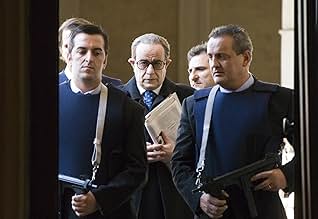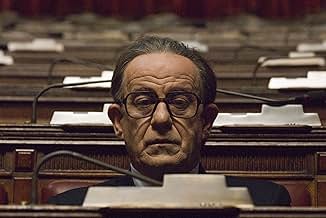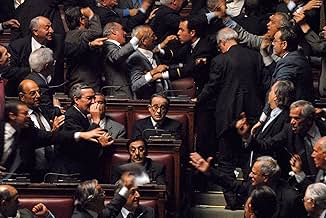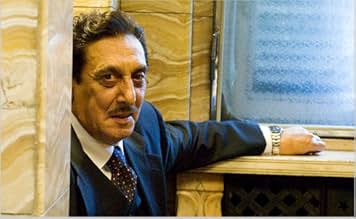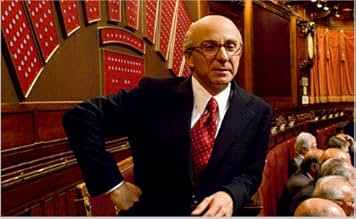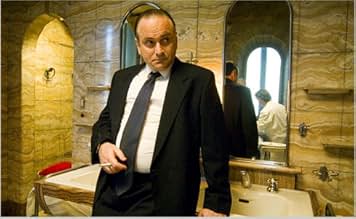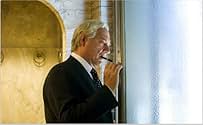IMDb रेटिंग
7.2/10
20 हज़ार
आपकी रेटिंग
इतालवी राजनेता गिउलिओ आंद्रेओटी की कहानी, जिन्होंने 1946 में, लोकतंत्र की बहाली के बाद से, सात बार इटली के प्रधानमंत्री के रूप में कार्य किया है.इतालवी राजनेता गिउलिओ आंद्रेओटी की कहानी, जिन्होंने 1946 में, लोकतंत्र की बहाली के बाद से, सात बार इटली के प्रधानमंत्री के रूप में कार्य किया है.इतालवी राजनेता गिउलिओ आंद्रेओटी की कहानी, जिन्होंने 1946 में, लोकतंत्र की बहाली के बाद से, सात बार इटली के प्रधानमंत्री के रूप में कार्य किया है.
- 1 ऑस्कर के लिए नामांकित
- 32 जीत और कुल 40 नामांकन
फ़ीचर्ड समीक्षाएं
A film to admire but impossible to love. Not an ounce of humanity to cling on to. Splendidly put together but only with the intellect so, for non Italians a puzzle that seems like a figment of someone's imagination and to be taken as a sort of intellectual metaphor. How can a creature from hell in good terms with the Catholic Church can survive all this years and when I say survive I mean survive from every possible angle. Italians know that is not only true but normal. I'm half Italian so I know what I'm talking about. Andreotti is played by Paolo Servillo in a performance that is part caricature, part faithful portrait, a work of genius and I suspect that the slightly surreal, grotesque undertones, allowed the movie to be made and succeed in the way it did, at least in Italy. I saw it in New York where I was the only spectator in the theater. I can't wait to see where director Sorrentino will take us next.
I'm sure if I were raised in Italy and paid attention to Italian politics day in and day out all of what transpires in Il Divo would be no less than engrossing. The story of Androetti, the head of a government that went for seven administrations and then went on to run for President has some really fascinating things to it. One of those is seeing just how the parliament works in those scenes midway through the picture and how the country actually chooses its president, which is so far removed from the US democratic process it's hard to fathom. And I also admired how the actor playing Androetti so got into this kind of quietly conniving politician, a man who believed that politics was everything and yet would never get passionate enough to raise his voice above a whisper. Somewhere inside of him a Dick Cheney is rumbling, perhaps.
But the problem in watching the film if you don't pay attention to the Italian politics of the period, or just in general, is that the filmmakers lose you fairly quickly. I usually find myself a viewer who doesn't like to be spoon-fed information very simply, but this is on the opposite end of the cannon where only a few real details are clear enough and then the rest comes whizzing by at a quick clip (and quick indeed as the camera style is akin to the operatic nature of Scorsese, only not as talented or focused). Names of characters keep coming up as title cards, and except for a couple of names like "The Lemon" (Androetti's right-hand man), none of them really stick out, and the incidents keep piling up without any real connection. At some point the basic story does reveal itself and holds some interest, but there's a disconnect between many scenes too, and a sense of cross-cutting done a few times (i.e. the horse race scene crossed with a shooting) comes off as unimaginative.
It's not a waste of time though if you're totally ignorant about Italy's political structure and brash sense of the power dynamic. But it's not one that I particularly enjoyed, either, and its lack of a connection with the mounting details made it harder to appreciate.
But the problem in watching the film if you don't pay attention to the Italian politics of the period, or just in general, is that the filmmakers lose you fairly quickly. I usually find myself a viewer who doesn't like to be spoon-fed information very simply, but this is on the opposite end of the cannon where only a few real details are clear enough and then the rest comes whizzing by at a quick clip (and quick indeed as the camera style is akin to the operatic nature of Scorsese, only not as talented or focused). Names of characters keep coming up as title cards, and except for a couple of names like "The Lemon" (Androetti's right-hand man), none of them really stick out, and the incidents keep piling up without any real connection. At some point the basic story does reveal itself and holds some interest, but there's a disconnect between many scenes too, and a sense of cross-cutting done a few times (i.e. the horse race scene crossed with a shooting) comes off as unimaginative.
It's not a waste of time though if you're totally ignorant about Italy's political structure and brash sense of the power dynamic. But it's not one that I particularly enjoyed, either, and its lack of a connection with the mounting details made it harder to appreciate.
This is a film of two parts - something which a previous comment didn't really make clear - we see the events of Italy during Andreotti's reign in the first half from Andreoti's point of view: then in the second half we see the same events again from (depending on your perspective) either a more dispassionate or a more disparaging observation.
As a bit of cinema it is brilliant (one or two IMO rather silly unslick bits of special FX, just ignore them!) but altogether not to be missed. I doubt that it will translate well, and even for a seasoned appassionato of Italian politics the introduction of characters using (clever) superimposed text was flawed by the overshort screen time which these important notes were allowed.
As a bit of cinema it is brilliant (one or two IMO rather silly unslick bits of special FX, just ignore them!) but altogether not to be missed. I doubt that it will translate well, and even for a seasoned appassionato of Italian politics the introduction of characters using (clever) superimposed text was flawed by the overshort screen time which these important notes were allowed.
I've heard several American viewers complain that this film is all style over substance. I couldn't disagree more.
I think that if a viewer is familiar with Italian Political History then this film comes off as absolutely breathtaking, and not just for its amazing filmic style. For one, the performances and interpretations of these real characters are spot on and for another the intelligence and courage to which the script approaches the ethical implications of Il Divo's actions, the breadth of moral exploration, how he defends himself to himself, to others and, often, directly to the viewer, is a welcomed shock and dose of complexity to the often polemic and overly-reductive discourse in Italian politics (not much different than here in the States in that regard). Lastly, for Italians, these events resonate incredibly and speak very much to the current power base in Italy. I truly feel that a lot of Americans are watching this film with cultural blinders on.
I won't lie, it is definitely designed for people that already have a strong grasp of the history. It doesn't weigh itself down with long explanations and exposition (except in text at the beginning and end of the film) so if you're coming to this to learn every sordid detail about its subject, or for a plot, even, then you might not find much reward in it. But as an exercise in unpacking a very complicated subject with real style, it's amazing!
I think that if a viewer is familiar with Italian Political History then this film comes off as absolutely breathtaking, and not just for its amazing filmic style. For one, the performances and interpretations of these real characters are spot on and for another the intelligence and courage to which the script approaches the ethical implications of Il Divo's actions, the breadth of moral exploration, how he defends himself to himself, to others and, often, directly to the viewer, is a welcomed shock and dose of complexity to the often polemic and overly-reductive discourse in Italian politics (not much different than here in the States in that regard). Lastly, for Italians, these events resonate incredibly and speak very much to the current power base in Italy. I truly feel that a lot of Americans are watching this film with cultural blinders on.
I won't lie, it is definitely designed for people that already have a strong grasp of the history. It doesn't weigh itself down with long explanations and exposition (except in text at the beginning and end of the film) so if you're coming to this to learn every sordid detail about its subject, or for a plot, even, then you might not find much reward in it. But as an exercise in unpacking a very complicated subject with real style, it's amazing!
This movie puts on screen what all Italians know since decades: directly or indirectly Andreotti is behind all major events happened in Italy in the last 45 years. This is what we know, as we all knew that virtually all politicians at all level were (and are) robbing the public funds and make private deals with business men.
The movie shows exactly this: we know it but we do not have the evidences.
Sorrentino tries to bridge this gap by putting together a lot of informations that make a pretty clear scenario, but without evidences. The result is a portrait of a divinity: you know that is there, you know that everything happens because of his will, but on earth everything happens by chance so that the fact that Andreotti is the mastermind of everything becomes a matter of divine faith.
The strength of the movie rests on the capacity to describe a personality that is so powerful that does not need to speak, does not need to go on TV, he is able to make things happen in a way that only Andreotti knows. Andreotti is above the politics, above the Church, above finance, above mafia, he is depicted as a power that stands on its own, someone who uses all the different leverages to rule.
Andreotti got it away with his trials and only Andreotti knows how. For a man of his power, it was the least you could expect.
At the end, Italians have to acknowledge that in the 20th century Italy was ruled by the King (shortly), Mussolini and Andreotti. But if you remember the Glossary shown at the beginning of the movie, through the Loggia P2, Sorrentino suggests that Berlusconi could be the person in charge to continue the job. Whether this is the will of Andreotti or not is a matter of faith.
The movie shows exactly this: we know it but we do not have the evidences.
Sorrentino tries to bridge this gap by putting together a lot of informations that make a pretty clear scenario, but without evidences. The result is a portrait of a divinity: you know that is there, you know that everything happens because of his will, but on earth everything happens by chance so that the fact that Andreotti is the mastermind of everything becomes a matter of divine faith.
The strength of the movie rests on the capacity to describe a personality that is so powerful that does not need to speak, does not need to go on TV, he is able to make things happen in a way that only Andreotti knows. Andreotti is above the politics, above the Church, above finance, above mafia, he is depicted as a power that stands on its own, someone who uses all the different leverages to rule.
Andreotti got it away with his trials and only Andreotti knows how. For a man of his power, it was the least you could expect.
At the end, Italians have to acknowledge that in the 20th century Italy was ruled by the King (shortly), Mussolini and Andreotti. But if you remember the Glossary shown at the beginning of the movie, through the Loggia P2, Sorrentino suggests that Berlusconi could be the person in charge to continue the job. Whether this is the will of Andreotti or not is a matter of faith.
क्या आपको पता है
- ट्रिवियाThe first cut of the movie was 145-minute long.
- भाव
Giulio Andreotti: I know I am an average man but looking around I do not see any giant.
- क्रेज़ी क्रेडिटEnd credits features the following dedication: "per Daniela, che mi ha salvato" ("for Daniela, who saved me"). Daniela D'Antonio is Paolo Sorrentino's wife.
- कनेक्शनFeatured in The 82nd Annual Academy Awards (2010)
- साउंडट्रैकLa prima cosa bella
Written by Mogol, Gian Piero Reverberi and Nicola Di Bari
Performed by Ricchi e Poveri
Published by Universal Music Publishing Ricordi S.r.l.
Courtesy of EMi Music Italy S.p.a.
टॉप पसंद
रेटिंग देने के लिए साइन-इन करें और वैयक्तिकृत सुझावों के लिए वॉचलिस्ट करें
- How long is Il Divo?Alexa द्वारा संचालित
विवरण
बॉक्स ऑफ़िस
- बजट
- €57,00,000(अनुमानित)
- US और कनाडा में सकल
- $2,40,159
- US और कनाडा में पहले सप्ताह में कुल कमाई
- $13,867
- 26 अप्रैल 2009
- दुनिया भर में सकल
- $1,12,60,366
- चलने की अवधि
- 1 घं 50 मि(110 min)
- रंग
- ध्वनि मिश्रण
- पक्ष अनुपात
- 2.35 : 1
इस पेज में योगदान दें
किसी बदलाव का सुझाव दें या अनुपलब्ध कॉन्टेंट जोड़ें


